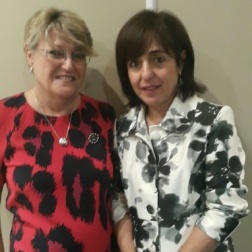
Organisations

WIZO still enormously active after more than 100 years
MARGOT COHEN
Pictured: Lee Joffe and Andrea Wainer.
“It empowers women to identify with the State of Israel through education, support of beneficiaries and special projects,” explained Andrea Wainer, co-chairman of WIZO Johannesburg, in her chairman’s report.
“We link ourselves with Israel and become partners in the upliftment of the lives of people in Israel,” At the Beyachad auditorium, Wainer last week outlined WIZO’s programme of events and projects of 2015, both locally and in Israel. Some of the programmes in Johannesburg included a golf day, a Yom Ha’atzmaut party and regular “Lunch and Learn” sessions with Rabbi Michael Katz.
In Israel Neve WIZO provides a loving home environment for children who have been removed from their biological families by court order. There are five homes with house parents who take care of up to eight children, from babies to 18 years of age. These children receive support from psychologists, social workers and educational staff, to help them grow into productive Israeli citizens.
Ironi Cariera is a diagnostic treatment and rehabilitation centre for delinquent youth, operating in conjunction with the Tel Aviv municipality and the Israeli Ministry of Labour. Another beneficiary is Beit Halochem which supervises rehabilitation therapies including sports programmes for injured soldiers and victims of terror.
At the World WIZO Conference in Tel Aviv in January, a delegation of 26 South African women, including 10 from Johannesburg, attended.
Helen Maisels Trisk, whose late mother Muriel worked tirelessly for WIZO and whose sister, Elizabeth, is currently chairman of WIZO Oxford, described how overwhelming the experience had been.
“It was a remarkable gathering of 500 delegates from 25 countries. Its aim was to show how WIZO embodies the very best in human values and the Jewish spirit.” The conference reiterated that WIZO was “a social movement for change and improvement in society with particular emphasis on the lives of women today”.
The theme was the “Empowerment of Women and its aim was to familiarise delegates with the many WIZO projects, bringing together delegates from all over the world, providing a platform of speakers.
“We got off the plane and went straight to see two of the day-care centres that we support – Chorley Day-Care Centre in Kfar Saba and Inez Bernstein,” Maisels Trisk explained:
The conference took place at the Hilton Hotel in several conference halls. Most speeches were in English, translated simultaneously into Spanish and French.
There was a lightening-like energy about the event, said Maisels Trisk. The SA delegation was one of the smaller ones “but we were inspired to participate more fully in future”.
Two speakers who stood out for her were Adi Altschuler, one of Time Magazine’s Women of the Year in 2014. When she was 12 she formed a relationship with a cerebral palsied boy, which inspired her decision to create an organisation called Krembo Wings, a model of Israel’s contemporary strain of volunteerism.
Fainy Goldschmidt, a haredi woman formed a support group of Orthodox women following her divorce. She was ostracised by the community at the time; WIZO gave her the tools to form the support group.
Maisels Trisk says the trip afforded her the chance to see exactly what WIZO is and how it changes lives.




